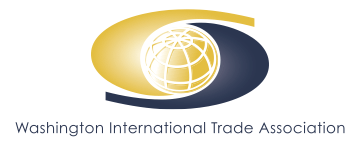Tuesday, February 22nd, 2022
12:30 – 1:30 p.m. EST/6:30 – 7:30 p.m. CET
via Zoom
We were pleased to invite you to join the Insitute for International Economic Policy for a webinar featuring the Chief Economist of the WTO Bob Koopman discussing “Trade Shocks and Supply Chains: What is Happening to the WTO and Globalization?” Prof. Michael Moore moderated and IIEP Director Jay Shambaugh provided welcoming remarks. This event was in partnership with the GW Department of Economics Trade and Development Workshop organized by Yingyan Zhao and Remi Jedwab.
Since 2016 international trade has been subjected to increased geo-political uncertainty and more recently a major global health shock. How has the WTO and globalization responded? The initial Trump administration policy shocks resulted in mainly higher prices and trade diversion. The COVID-19 pandemic resulted in a number of restrictive trade policies mainly due to health policy restrictions, but also substantial fiscal and monetary policy responses in the advanced economies. The combination of economic and health policies brought about a dramatic compositional shift in demand from in-person services to tradeable goods stressing global and national supply chains. How has the global trading system responded? What role, if any, will globalization play in the future on the Phillips curve and inflation? These are important questions for the global trading system given the prospect of continued global health challenges and rising climate challenges.
About the Speaker:
 Bob Koopman is currently the Chief Economist of the World Trade Organization and an Adjunct Professor of International Economics at the Graduate Institute, Geneva. At the WTO Bob serves as Chief Economic Counsellor to the Director-General, and provides the WTO Secretariat and Member Countries with analysis and information that promotes a deeper understanding of trade and trade policy’s role in economic growth and development. At the Graduate Institute Bob teaches courses on international trade. Bob also serves as the WTO representative to the G20 Trade and Investment Working Group and the G20 Framework Group. He is a research associate of CEPR, London, and an editor of the Springer Series on Advances in Applied General Equilibrium Modeling.
Bob Koopman is currently the Chief Economist of the World Trade Organization and an Adjunct Professor of International Economics at the Graduate Institute, Geneva. At the WTO Bob serves as Chief Economic Counsellor to the Director-General, and provides the WTO Secretariat and Member Countries with analysis and information that promotes a deeper understanding of trade and trade policy’s role in economic growth and development. At the Graduate Institute Bob teaches courses on international trade. Bob also serves as the WTO representative to the G20 Trade and Investment Working Group and the G20 Framework Group. He is a research associate of CEPR, London, and an editor of the Springer Series on Advances in Applied General Equilibrium Modeling.
Prior to joining the WTO and the Graduate Institute Bob was Chief Operating Officer at the United States International Trade Commission and an Adjunct Professor of Economics at Georgetown University. Bob has also previously served as Chief Economist at the USITC, Deputy Administrator for social sciences at what is now the National Institute for Food and Agriculture, USDA, and various leadership and analyst positions at the Economic Research Service of USDA.
About the Moderator:
 Michael Moore received his B.A. in liberal arts from the University of Texas at Austin and his M.S. and Ph.D. in economics from the University of Wisconsin-Madison. He is Director of the Masters of Arts in International Economic Policy program and has been a faculty member at the Elliott School since receiving his doctorate in 1988. Professor Moore teaches undergraduate and graduate courses in international trade theory and policy as well as international macroeconomics. He also has taught international economics to US diplomats at the Foreign Service Institute and students at the Fondation Nationale des Sciences Politiques (Sciences-Po) in Paris. He has published in numerous academic journals including the Journal of International Economics, International Trade Journal, Canadian Journal of Economics, Review of International Economics, European Journal of Political Economy, and Weltwirtschaftliches Archiv, and has been a contributor to five books. His commentary has appeared in numerous media outlets, including The Washington Post, The Financial Times, CNN, CBC, NPR, and NBC.
Michael Moore received his B.A. in liberal arts from the University of Texas at Austin and his M.S. and Ph.D. in economics from the University of Wisconsin-Madison. He is Director of the Masters of Arts in International Economic Policy program and has been a faculty member at the Elliott School since receiving his doctorate in 1988. Professor Moore teaches undergraduate and graduate courses in international trade theory and policy as well as international macroeconomics. He also has taught international economics to US diplomats at the Foreign Service Institute and students at the Fondation Nationale des Sciences Politiques (Sciences-Po) in Paris. He has published in numerous academic journals including the Journal of International Economics, International Trade Journal, Canadian Journal of Economics, Review of International Economics, European Journal of Political Economy, and Weltwirtschaftliches Archiv, and has been a contributor to five books. His commentary has appeared in numerous media outlets, including The Washington Post, The Financial Times, CNN, CBC, NPR, and NBC.
Professor Moore has served as Director of the Institute for International Economic Policy, Director of the International Trade and Investment Policy Program, and Associate Dean at the Elliott School.
Professor Moore served as Senior Economist for international trade on the President’s Council of Economic Advisors from 2002 to 2003.
Welcoming Remarks:
 Jay Shambaugh is a Professor of Economics and International Affairs, and Director of the Institute for International Economic Policy at the Elliott School of International Affairs, George Washington University. His area of research is macroeconomics and international economics. He has had two stints in public service. He served as a Member of the White House Council of Economic Advisors from 2015-2017. Earlier, he served on the staff of the CEA as a Senior Economist for International Economics and then as the Chief Economist. He also spent 3 years as the Director of the Hamilton Project at the Brookings Institution. Jay is also a Faculty Research Fellow at the NBER and Non-Resident Senior Fellow in Economic Studies at Brookings. Prior to joining the faculty at George Washington, Jay taught at Georgetown and Dartmouth and was a visiting scholar at the IMF. He received his Ph.D. in economics from the University of California at Berkeley, an M.A. from the Fletcher School at Tufts, and a B.A. from Yale University.
Jay Shambaugh is a Professor of Economics and International Affairs, and Director of the Institute for International Economic Policy at the Elliott School of International Affairs, George Washington University. His area of research is macroeconomics and international economics. He has had two stints in public service. He served as a Member of the White House Council of Economic Advisors from 2015-2017. Earlier, he served on the staff of the CEA as a Senior Economist for International Economics and then as the Chief Economist. He also spent 3 years as the Director of the Hamilton Project at the Brookings Institution. Jay is also a Faculty Research Fellow at the NBER and Non-Resident Senior Fellow in Economic Studies at Brookings. Prior to joining the faculty at George Washington, Jay taught at Georgetown and Dartmouth and was a visiting scholar at the IMF. He received his Ph.D. in economics from the University of California at Berkeley, an M.A. from the Fletcher School at Tufts, and a B.A. from Yale University.

